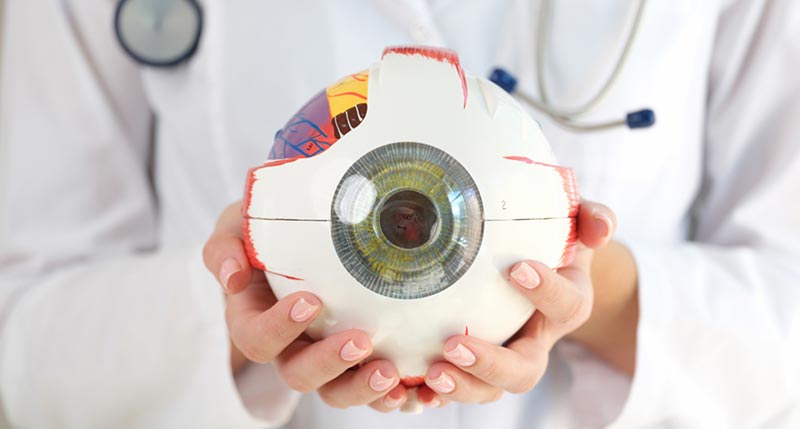Find an Optometrist Near Me for Your Eye Wellness
The Significance of Normal Eye Exams: Insights From a Seasoned Eye Medical Professional
Normal eye examinations offer as a crucial part of healthcare that prolongs beyond simple vision adjustment. A seasoned eye physician can provide understandings into just how these analyses not only detect typical eye conditions but also reveal underlying wellness problems that might or else go unnoticed.
Advantages of Routine Eye Tests
Although many individuals may forget the value of routine eye exams, these analyses play a vital role in maintaining total wellness and wellness. Regular eye assessments offer not only to examine vision yet likewise to detect early signs of systemic wellness issues, consisting of diabetes and hypertension. By determining these conditions at their inception, people can get prompt interventions, significantly enhancing lasting end results.
In addition, eye tests can help in keeping track of existing health and wellness problems, ensuring that any modifications in vision or eye health and wellness are quickly resolved (optometrist). The analyses permit tailored referrals regarding glasses, way of living modifications, and safety actions versus possible eye pressure or damages
Beyond physical wellness, the advantages of normal eye exams include improving top quality of life. Boosted vision assists in better efficiency in everyday tasks, from reading to driving, therefore adding to better self-reliance and safety and security. Eventually, focusing on eye tests promotes a proactive strategy to wellness monitoring, encouraging individuals to organize their health. Routine check-ups are an essential part of a thorough health care strategy, making certain that both vision and total health are preserved throughout life.
Common Eye Issues Detected
Regular eye examinations are critical in identifying a variety of typical eye problems that can dramatically influence vision and overall health and wellness. Among the most prevalent conditions recognized throughout these exams are refractive errors, including myopia (nearsightedness), hyperopia (farsightedness), and astigmatism. These conditions often show up as obscured vision and can be conveniently fixed with prescription glasses or contact lenses.
Furthermore, cataracts, which cause clouding of the lens, are regularly identified in older adults. This problem can lead to decreased vision and calls for surgical treatment for resolution. One more usual concern is glaucoma, a group of eye illness that harm the optic nerve, commonly linked to increased intraocular stress. Early detection is important as it can protect against irreversible vision loss.
Age-related macular deterioration (AMD) is an additional significant condition that affects central vision, specifically in individuals over 50. Finally, diabetic retinopathy, a complication of diabetes, can bring about severe vision problems otherwise monitored consistently. Via comprehensive eye tests, these conditions can be identified early, allowing for prompt administration and therapy to maintain vision and boost top quality of life.
Importance of Very Early Detection
Early detection of eye conditions plays a vital duty in protecting vision and stopping substantial wellness issues. Numerous eye illness, such as glaucoma, diabetic retinopathy, and age-related macular deterioration, can progress quietly without visible signs in their onset. By the time signs and symptoms show up, irreversible damage may have occurred, leading to long-term vision loss.
Normal eye examinations promote very early diagnosis, allowing for prompt treatment and therapy. As an example, dealing with elevated intraocular stress can stop the beginning of glaucoma, while managing blood sugar levels can dramatically lower the threat of diabetic person retinopathy. Additionally, problems like cataracts can be properly handled with medical treatment when identified early.

Just How Typically Should You Visit?
Identifying the frequency of eye tests is necessary for maintaining ideal eye health and vision. The general referral for grownups is to have a detailed eye test each to 2 years, depending upon individual danger factors and age. For people aged 18 to 60, a test every 2 years is commonly adequate if no vision troubles are present. However, those over 60 should consider annual exams, as the threat of age-related problems boosts considerably.
Individuals with particular risk aspects, such as a household background of eye directory disease, diabetes mellitus, or existing vision troubles, may call for more constant assessments. Kids must have their very first eye examination at six months of age, complied with by added exams at age 3 and prior to entering school. Regular check-ups throughout youth are crucial as vision can alter rapidly throughout developing years.
Eventually, the frequency of check outs need to be customized to each individual's circumstances, including way of living, work dangers, and any kind of pre-existing eye conditions. Consulting with an eye care specialist can give customized referrals, ensuring that your eye health is regularly kept track of and maintained.
Tips for Your Eye Test
Preparing for your eye exam can enhance the effectiveness of the browse through and ensure a detailed analysis of your eye health and wellness. To optimize your time with the eye doctor, it is essential to gather pertinent info prior to your consultation. Begin by compiling a checklist of any kind of drugs you are presently taking, consisting of non-prescription medications and supplements, as these can influence eye wellness.
In addition, record any symptoms you have experienced, such as obscured vision, pain, or headaches. This info will assist your ophthalmologist in detecting possible issues. If you use glasses or contact lenses, bring them along, even if you don't use them on a regular basis. This will help the medical professional analyze any kind of changes in your vision.
It is likewise helpful to have a household history of eye conditions available, as hereditary elements can add to your eye health. Finally, think about arranging your exam for a while when you are less rushed, allowing you to ask inquiries and review your problems completely. By preparing adequately, you make certain that your eye test is productive which your eye physician has all the required info to offer the most effective treatment feasible.

Final Thought
Normal eye tests play a crucial role in keeping both vision and total health. Eventually, focusing on extensive eye evaluations contributes considerably to the preservation of vision and the improvement of quality of life, underlining the necessity of routine eye care in preventive healthcare techniques.
Regular eye tests are instrumental in finding a selection of common eye conditions that can significantly impact vision and overall wellness.Figuring out the regularity of eye exams is crucial for keeping optimum eye wellness and vision.Preparing for your eye test can improve the performance of the check out and ensure a detailed assessment of your eye health (optometrist). By preparing appropriately, you guarantee that your eye test is productive content and that your my site eye physician has all the necessary info to provide the best treatment possible
Eventually, focusing on comprehensive eye analyses adds considerably to the conservation of vision and the enhancement of quality of life, underscoring the necessity of regular eye treatment in preventative medical care techniques.